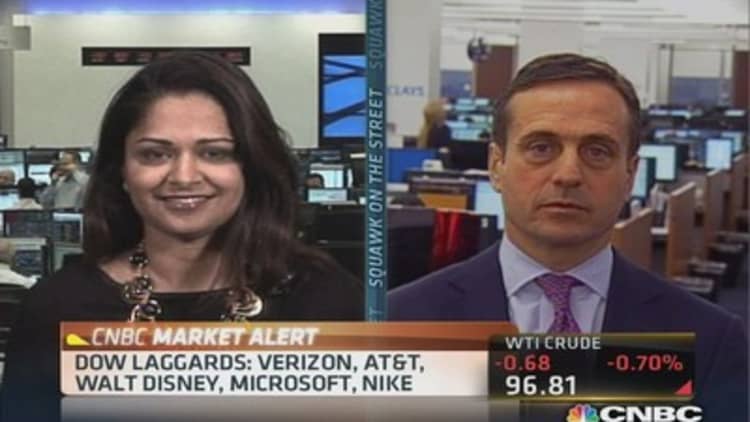
Investors should not only treat Monday's selloff in U.S. equities as a "natural phenomenon," but also as a chance to grab some big-name stocks, said Bank of America Merrill Lynch's head U.S. equity strategist.
In an interview with CNBC on Monday, amid a heavy, triple-digit selloff on Wall Street, Bank of America's Savita Subramanian said some marquee names with global diversification look cheap after several days of losses. Her comments come as market observers wonder whether the recent stock market correction in Japan could happen in the U.S.
"I do see this as a great buying opportunity for some of the higher-quality names in the that have sold off on emerging market exposure," Subramanian said on "Squawk on the Street." "Or have sold off just because they had a whiff of exposure in these regions that are flashing some dangerous signals."
(Read more: More bumps ahead as market awaits big report)
Barry Knapp, the head of U.S equity portfolio strategy at Barclays, remained unconvinced that the market presented smart buying opportunities just yet. If the S&P 500 reaches 1,700, however, that could change his mind.
Historically, the U.S. stock market sees an 8.5 percent decline after the Fed begins to normalize monetary policy, Knapp said. Once the market sees that decline, he said, stocks should bounce back.
(Read more: The VIX is surging on market fear, but not loathing)
"In today's environment, that permeates throughout the world," Knapp said of the Fed's policies. "Our way of framing this whole dynamic out is that we'll probably get something similar. ... At that point the rest of the world would probably stabilize as well, at least where they haven't done serious damage to their economy by raising interest rates sharply in response to it."
(Read more: Jack Bogle's advice for a rocky market)
Knapp said he does not see the same kind of correction that hit the Japanese Nikkei stock market this week spreading to the United States.
Subramanian agreed with Knapp, and went on to say that the U.S. stock market has historically seen 5 percent pullbacks about three times a year, especially around changes in monetary policy.
Subramanian believes an expansion in capital expenditures will help drive up stocks in 2014, but that investors remain anxious after record stock market gains last year and the Fed's plans to scale down its economic stimulus programs.
"We're still in that wall of worry phase where we're looking for what could go wrong instead of what could go right," Subramanian said.
During a CNBC interview in December, Subramanian predicted the S&P 500 would end this year at 2,000.
"Right now you have the opportunity to buy high-quality names with global diversification at a quite attractive price tag," she said Monday.
—By CNBC's Jeff Morganteen. Follow him on Twitter at @jmorganteen and get the latest stories from "Squawk on the Street."


